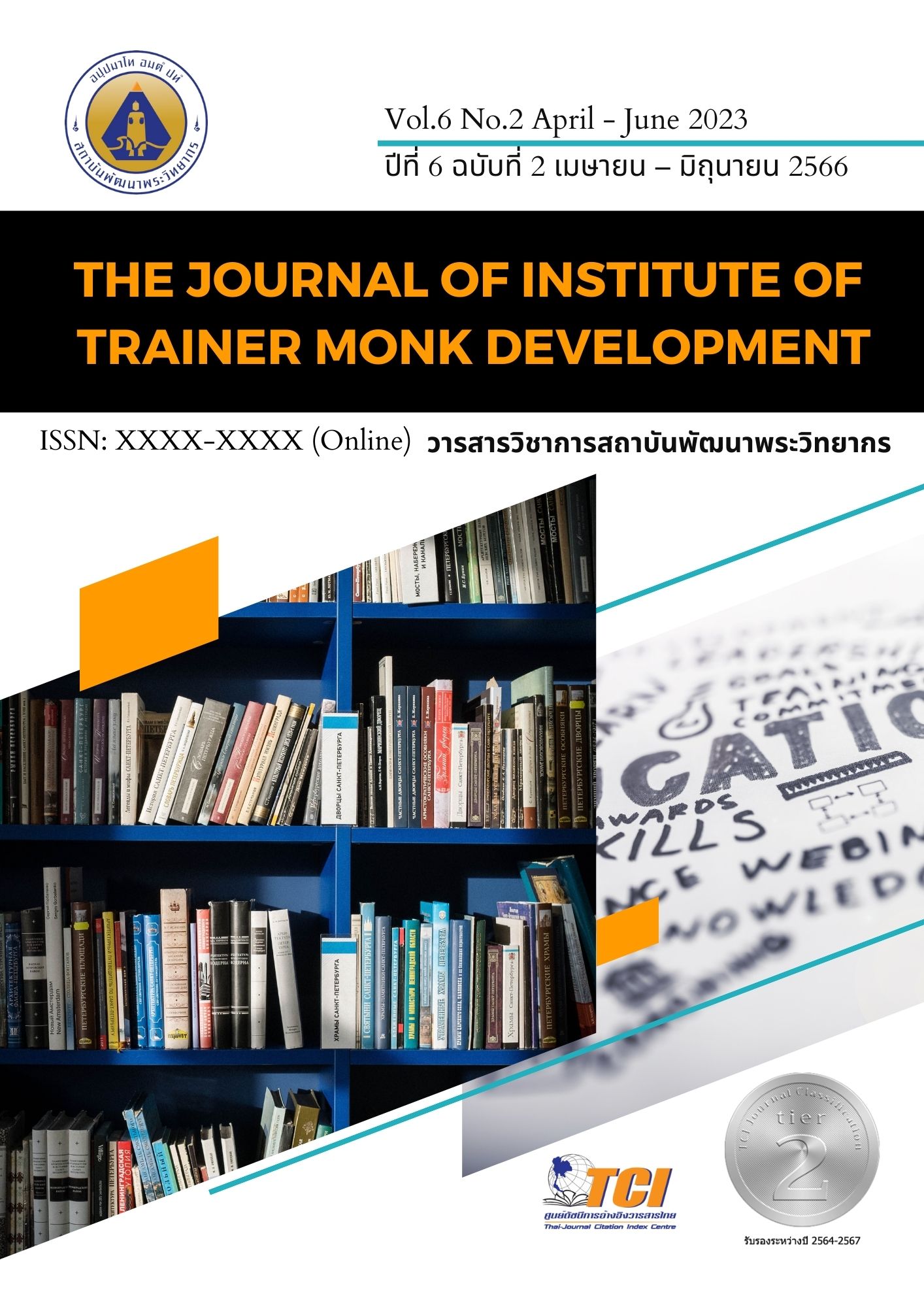A Model of Using Songkran Activities to Foster Relationships of Thai and Burmese Buddhists in Krathum Lom Subdistrict, Sampran District, Nakhon Pathom Province
Main Article Content
Abstract
This research has objectives: 1) to investigate the practice during Songkran festival of Burmese Buddhists; 2) to develop the activities of Songkran festival in fostering relationships of Thai and Burmese Buddhists; and 3) to present a model of using Songkran activities to foster relationships of Thai and Burmese Buddhists in Krathum Lom Subdistrict, Sampran District, Nakhon Pathom Province. From the study, the following results are found: 1) Temples organize cultural and traditional activities with the goal of strengthening identity, passing down values, and establishing what should be performed during the Thai Songkran festival. 2) Activities that emphasize the relationship of Thai and Burmese Buddhists have already been carried out by every temple in Thailand, but the tangible promotion can be seen in the collaboration between Thai and Burmese to complete the task whenever there is any Buddhist tradition. 3) The organization of Songkran festival to foster relationships of Thai and Burmese Buddhists in Krathum Lom Subdistrict, Sampran District, Nakhon Pathom Province consists of four kinds of activities: (1) alms round of the two nations; (2) sprinkling water onto the Buddha statues to show gratitude; (3) making merits to the departed and ancestors; and (4) forming sand pagodas. These activities' values include: (1) value for the community (2) value for the society since and (3) value for religion.
Article Details

This work is licensed under a Creative Commons Attribution-NonCommercial-NoDerivatives 4.0 International License.
บทความที่ได้รับการตีพิมพ์เป็นลิขสิทธิ์ของวารสารวิชาการสถาบันพัฒนาพระวิทยากร
ข้อความที่ปรากฎอยู่ในบทความที่ได้รับการตีพิมพ์ในวารสาร ถือเป็นความรับผิดชอบของผู้เขียนบทความ และข้อคิดเห็นนั้นไม่ถือว่าเป็นทัศนะและความรับผิดชอบของกองบรรณาธิการวารสารวิชาการสถาบันพัฒนาพระวิทยากร
References
มหาจุฬาลงกรณราชวิทยาลัย. (2539). พระไตรปิฎกภาษาไทย ฉบับมหาจุฬาลงกรณราชวิทยาลัย.กรุงเทพมหานคร: โรงพิมพ์มหาจุฬาลงกรณราชวิทยาลัย.
พระบาทสมเด็จพระจุลจอมเกล้าเจ้าอยู่หัว. (2505). พระราชพิธีสิบสองเดือนพระนคร. กรุงเทพมหานคร โรงพิมพ์คุรุสภา.
พระพรหมคุณาภรณ์. (2555). ความสำคัญของพระพุทธศาสนา. กรุงเทพมหานคร: โรงพิมพ์สหธรรมิก.
พิพัฒน์ กระแจะจันทร์. (2559). สาดน้ำสงกรานต์วัฒนธรรมร่วมรากเอเชีย เทศกาลโฮลี สงกรานต์สีในอินเดีย. กรุงเทพมหานคร: โรงพิมพ์พระพุทธศาสนาแห่งชาติ.
วันดี ศรีสวัสดิ์ และคณะ. (2559). เรื่องการศึกษาองค์ความรู้ทางวัฒนธรรมและภูมิปัญญาท้องถิ่นในพื้นที่ตำบลทับน้ำ อำเภอบางปะหัน จังหวัดพระนครศรีอยุธยา. รายงานการวิจัย.มหาวิทยาลัยเทคโนโลยีราชมงคลสุวรรณภูมิ.
บุษบา หินเธาว์ และคณะ. (2564). การศึกษาวิถีชีวิต วัฒนธรรม ประเพณีของคนส่วนใหญ่ในชุมชนบ้านนาเมือง อำเภอชาติตระการ จังหวัดพิษณุโลก. รายงานการวิจัย. คณะวิทยาการจัดการ มหาวิทยาลัยราชภัฏพิบูลสงคราม.
สมรักษ์ ชัยสิงห์กานานนท์ และจักรี โพธิมณี. (2560). การปฏิสัมพันธ์ระหว่างชุมชนชาติพันธุ์ในอำเภอกระทุ่มแบนและอำเภอบ้านแพ้ว จังหวัดสมุทรสาคร. รายงานการวิจัย. ศูนย์มานุษยวิทยาสิรินธร: ศูนย์มานุษยวิทยาสิรินธร (องค์การมหาชน).
สุจิตต์ วงษ์เทศ. (2564). เลี้ยงผีเดือน 5 เมษายน สงกรานต์ของแขกพราหมณ์ถูกแปลงเป็นไทย พุทธสมัยอยุธยา. สืบค้นข้อมูลเมื่อวันที่ 1 กันยายน 2564 จาก https://www.matichonweekly.com/column/article_96418
สมภาร พรมทา. (2554). มนุษย์กับศาสนา. กรุงเทพมหานคร: สำนักพิมพ์สยาม.
เดือน คำดี. (2553). ศาสนศาสตร์. กรุงเทพมหานคร: สำนักพิมพ์มหาวิทยาลัยเกษตรศาสตร์.


